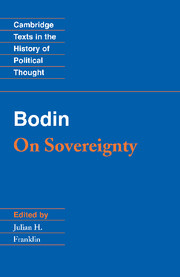Book contents
- Frontmatter
- Contents
- Acknowledgments
- Introduction
- Principal events in Bodin's life
- Bibliography
- Note on the text
- Notes on format
- Notes on translation
- République, edition of 1583 (Paris), table of contents
- Book I, chapter 8, On sovereignty
- Book I, chapter 10, On the true marks of sovereignty
- Book II, chapter 1, On the kinds of state in general
- Book II, chapter 5, Whether it is lawful to make an attempt upon the tyrant's life and to nullify and repeal his ordinances after he is dead
- Textual notes
- Index
- Cambridge Texts in the History of Political Thought
Book II, chapter 1, On the kinds of state in general
Published online by Cambridge University Press: 05 June 2012
- Frontmatter
- Contents
- Acknowledgments
- Introduction
- Principal events in Bodin's life
- Bibliography
- Note on the text
- Notes on format
- Notes on translation
- République, edition of 1583 (Paris), table of contents
- Book I, chapter 8, On sovereignty
- Book I, chapter 10, On the true marks of sovereignty
- Book II, chapter 1, On the kinds of state in general
- Book II, chapter 5, Whether it is lawful to make an attempt upon the tyrant's life and to nullify and repeal his ordinances after he is dead
- Textual notes
- Index
- Cambridge Texts in the History of Political Thought
Summary
Now that we have spoken of sovereignty, and of the rights and marks thereof, we have to see, in any given commonwealth, who has sovereignty in order to determine what its state is. If sovereignty lies in a single prince, we will call it monarchy; if all of the people have a share, we will say that the state is democratic (populaire); if it is only the lesser part of the people, we will hold that the state [252] is aristocratic. We will employ [only] these terms in order to avoid the confusion and obscurity arising from the variety of good or bad rulers which has prompted many to distinguish more than three kinds of state. For if that opinion prevailed, and the state of a commonwealth were determined by some standard of virtue or vice, there would be a world of them. But it is clear that to have true definitions and resolutions in any subject matter, one must fix not on accidents, which are innumerable, but on essential differences of form. Otherwise one could fall into an infinite labyrinth which does not admit of scientific knowledge. One would be coining types of state not only from the whole range of virtues and vices, but also from things that are morally indifferent, such as whether the monarch was chosen for his strength, or for his good looks, or for his height, or for his nobility [of birth], or for his wealth, which are all indifferent things.
- Type
- Chapter
- Information
- Bodin: On Sovereignty , pp. 89 - 109Publisher: Cambridge University PressPrint publication year: 1992



